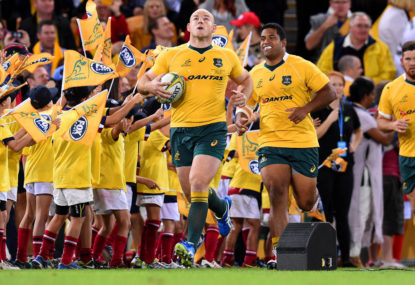Rugby Australia announce $9.2m deficit, board member fails to be re-elected but coup falls over
Six months after the Wallabies’ worst World Cup result, Rugby Australia has announced a $9.2 million deficit from the 2023 season. The Roar can…

It has been an interesting year for Australian rugby. Following a tremendously successful Rugby World Cup campaign, the Wallabies returned home under Michael Cheika without the silverware, but with a legion of recommitted and new passionate Aussie fans.
All was looking rosy, and then suddenly 2016 has opened the proverbial can of worms on the shallow underbelly of the code in Australia.
What prompted this article was a survey circulated by SANZAAR this week, calling on fans of the game to respond to a variety of questions ranging from match-day experience, to how you watch rugby and familiarity with opposition teams and stadiums.
For those that are interested, the survey can be found here.
Innocuous enough, but the more I analysed the questions the more I bemoaned the state of the game in the country. Here are a few of many headliners.
Administrative basket-cases
This year at the provincial level, we have seen the sacking of two coaches, one CEO, and the financial viability of the Force and Brumbies publicly called into question.
The ARU have formally partnered now with the Force, and without significant hand-holding it is very unclear the future directions the Brumbies can take given their consistent boardroom tumults and CEO turnover.
Bizarrely, in the media release following the sacking of CEO Michael Jones, the Brumbies board would only commit to financial security until the conclusion of the 2016 year.
It seems that rugby now has been spread beyond its means across Australia, in both player and management depth. Feasibly, how can we support more than three competitive teams in Super Rugby? Let’s be honest, the Force are there at the moment to alleviate the jet lag of teams travelling to and from South Africa.
Season scheduling
Firstly, the Super Rugby tournament. It is a competition I love, yet the mid-season breaks to accommodate the northern hemisphere tours is destroying the season. The competition loses its flow, and I almost have switched off once the international season has started.
Regarding internationals, what is the point of a ‘best of two’ series? While I am pleased to see we have three Bledisloe Tests in 2016, I fail to comprehend why the first two are on August 20 and 27, and the next is not until October 22. Three Tests in three weeks, and each year alternate home ground advantage.
Yes, one of these Tests is superfluous to the Rugby Championship also involving Argentina and South Africa, but Bledisloe is the premier event on the Australian rugby calendar and a three-Test series should be sacrosanct.
A return to one Test in the season being at 3pm on a Saturday afternoon every year is also a must. Traditionalist, I know, and I understand that TV requires night scheduling, but there is something special about sides running onto a footy field on a cool but sunny winter’s afternoon.
If I start writing about playing internationals at Homebush, I may cry…
Free-to-air access for games
I do have Foxtel and enjoy the coverage, but for rugby to expand we need a free-to-air mainstream provider. Super Rugby is a fantastic tournament, generally a lot more open than the naturally more conservative international level, and showcases some fantastic running elements of the game.
To promote rugby, surely we need a free-to-air presence that is not limited to the odd delayed replay match of the provincial-level game?
Don’t forget your heartland – club rugby in Brisbane and Sydney
Cue potential eye-rolls, but the heartlands have copped a massive hit over the last two decades, lost in the adjustment to professionalism and some very mediocre attempts to generate a sub-provincial competition, similar to South Africa’s Currie Cup or New Zealand’s NPC.
I won’t say too much on this, but my view is that ‘talent’ now is shepherded and mollycoddled into academies at a young age, and young players don’t actually learn any life skills.
As examples, from learning to scrum against a gnarled yet wily dinosaur on a rock-hard cricket pitch in the middle of suburbia, to regularly kicking pressure penalties and conversions in match conditions where there is actually a wind factor.
The long-term effects of the move away from club rugby will be profound – when Wallabies have no connection to a club, who is going to be the local poster-boy for juniors, or who can the up and comers aim up against?
I could go on, but I don’t want to diminish a lot of upside to this Wallabies team, despite last weekend’s setback.
Michael Cheika is an old-school rugby nut from Randwick who has brought passion back into the Wallabies’ jersey. Players are now readily accessible to fans and there is sense of optimism for our national team.
I really do hope it builds the next generation for Australian rugby, and all could learn a lot from his modus operandi.
It is a shame he is building on such crumbled foundations.